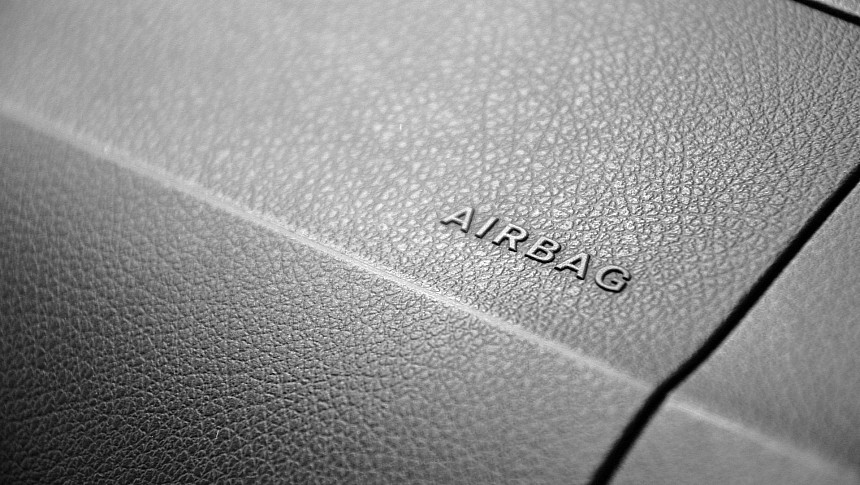The gargantuan Takata airbag recall has been a wake-up call to the automotive industry, revealing critical issues in the design, production, and oversight of essential vehicle safety components. Or has it?
Despite starting in 2013, the former Japanese safety company's mishap is still ongoing, impacting millions of cars built in the last two decades. Yes, Takata is responsible for the largest automotive recall in history.
As a reminder, the issue behind the massive safety crisis revolved around the company's airbag inflators, which were found to be prone to rupture, potentially causing severe injury or even death.
According to the company, the flaw was linked to the use of ammonium nitrate, a volatile compound, to inflate the airbag. Because, if you didn't know, airbags aren't fully pillows when you crash; they go boom! Albeit, it should typically be a controlled "boom." Apparently, the defect is exacerbated by high humidity and temperature variations.
The recall's scale was unprecedented, involving over 100 million vehicles from multiple carmakers, including Honda, Toyota, Ford, BMW, and General Motors, among many others.
You'd think all this mayhem should be in the past, save for the few old cars that are technically still affected by Takata airbags, right?
As it happens, a new, monstrous recall involving airbags looms on the horizon. By that, I mean up to 52 million (yes, million) cars from various American, European, Japanese, and South Korean manufacturers are being targeted. In other words, just about every mainstream carmaker you know, both old and new, so even Tesla is included.
U.S. vehicle safety authorities first demanded a voluntary recall in May this year, which instructed that the staggering 52 million airbag inflators must be subject to a recall due to the potential risk of rupture during deployment, potentially causing the release of hazardous metal fragments toward the occupants. All the airbags have been manufactured by auto suppliers ARC Automotive and Delphi Automotive. Delphi assembled about 11 million of the bunch on behalf of ARC, which manufactured the remaining 41 million.
Now get this: the reason for not hearing anything from your car dealer about a new airbag recall all these months is that there isn't one, at least yet. Apparently, ARC Automotive rejected a voluntary recall after the NHTSA recommended one in May, and they disagreed with the agency's tentative conclusion that a defect even existed in the massive batch of airbags.
Last month, the NHTSA reiterated that it has knowledge of seven verified cases of inflator ruptures within the United States concerning the vehicles targeted for the proposed recall, resulting in seven injuries and one fatality starting with 2014. Even though it's beginning to sound like a cat-and-mouse game where the mouse keeps getting the cheese and the cat watches it in discontent, the NHTSA has yet to enforce the massive recall it desires.
On the one hand, ARC Automotive and some of the carmakers it supplies say that the numbers are being blown out of proportion. If we look at it strictly from a statistical point of view, they are absolutely right.
NHTSA's numbers initially revolved around 67 million airbags in May but have since been adjusted to "only 52 million." From those 52 million, the agency emphasizes that a better context for those seven incidents was not the total 52 million vehicles but the 2.6 million inflators estimated to have been deployed thus far.
NHTSA had implemented a standing order to ARC Automotive in 2016, mandating the reporting of ruptures during airbag manufacturing. In 2018, ARC responded by incorporating borescopes to identify excess metal debris in its inflators. The company conducted tests in 2018, analyzing over 900 inflators retrieved from salvage yards from MY 2001 through 2005 cars, and found no ruptures. The NHTSA says that carmakers reported ruptures in 2021 and 2023.
Another problem is that GM alone is said to have at least 20 million vehicles with ARC Automotive parts and agreed in May to voluntarily recall almost 1 million cars with said airbag inflators after a rupture resulted in Chevrolet Traverse driver's injuries in March.
NHTSA officials have highlighted that the likelihood of a severe injury was approximately one in 370,000 deployments of these inflators. While that may not sound as bad in the context of statistics, a driver of any of the cars affected has a better chance of an airbag exploding in their face than winning the Powerball, where the odds stand at 1 in 292.2 million.
ARC officials responded that the company operates as a Tier 2 supplier and isn't legally obliged to initiate recalls like a carmaker or a Tier 1 supplier. However, in its September initial decision letter, NHTSA contended that ARC is not exempt from complying with federal safety regulations.
The same September document outlined 12 manufacturers whose vehicles could potentially be subject to a recall due to this issue. These carmakers include General Motors, BMW, Ford, General Motors, Hyundai Motor, Kia, Mercedes-Benz, Porsche, Stellantis, Tesla, Toyota, and Volkswagen.
The problem is linked to manufacturing debris left inside the inflators, which can become dislodged and result in a hazardous rupture. ARC Automotive officials say that the data and extensive testing indicate that the seven incidents associated with these inflators are considered "isolated" and are "not indicative of a systemic defect."
If you're thinking that the NHTSA is letting this one slip, especially after the Takata fiasco, you're wrong. The agency recently told at a public hearing the government should require the recall of all 52 million airbag inflators produced by ARC Automotive and Delphi Automotive.
While it is not yet a given, the rarely-used NHTSA public hearing could prompt the second-largest recall in history.
"One death is a tragedy, a million deaths a statistic." This is a quote attributed to Joseph Stalin and one that I'm sure no one at ARC Automotive would like to be known for.
The NHTSA is open to receiving written responses from the public regarding the hearing until December 4. Following this, a final decision on the recall is anticipated to be released, and the odds are that it will get the go-ahead.
As a reminder, the issue behind the massive safety crisis revolved around the company's airbag inflators, which were found to be prone to rupture, potentially causing severe injury or even death.
According to the company, the flaw was linked to the use of ammonium nitrate, a volatile compound, to inflate the airbag. Because, if you didn't know, airbags aren't fully pillows when you crash; they go boom! Albeit, it should typically be a controlled "boom." Apparently, the defect is exacerbated by high humidity and temperature variations.
The recall's scale was unprecedented, involving over 100 million vehicles from multiple carmakers, including Honda, Toyota, Ford, BMW, and General Motors, among many others.
You'd think all this mayhem should be in the past, save for the few old cars that are technically still affected by Takata airbags, right?
As it happens, a new, monstrous recall involving airbags looms on the horizon. By that, I mean up to 52 million (yes, million) cars from various American, European, Japanese, and South Korean manufacturers are being targeted. In other words, just about every mainstream carmaker you know, both old and new, so even Tesla is included.
U.S. vehicle safety authorities first demanded a voluntary recall in May this year, which instructed that the staggering 52 million airbag inflators must be subject to a recall due to the potential risk of rupture during deployment, potentially causing the release of hazardous metal fragments toward the occupants. All the airbags have been manufactured by auto suppliers ARC Automotive and Delphi Automotive. Delphi assembled about 11 million of the bunch on behalf of ARC, which manufactured the remaining 41 million.
Now get this: the reason for not hearing anything from your car dealer about a new airbag recall all these months is that there isn't one, at least yet. Apparently, ARC Automotive rejected a voluntary recall after the NHTSA recommended one in May, and they disagreed with the agency's tentative conclusion that a defect even existed in the massive batch of airbags.
Last month, the NHTSA reiterated that it has knowledge of seven verified cases of inflator ruptures within the United States concerning the vehicles targeted for the proposed recall, resulting in seven injuries and one fatality starting with 2014. Even though it's beginning to sound like a cat-and-mouse game where the mouse keeps getting the cheese and the cat watches it in discontent, the NHTSA has yet to enforce the massive recall it desires.
On the one hand, ARC Automotive and some of the carmakers it supplies say that the numbers are being blown out of proportion. If we look at it strictly from a statistical point of view, they are absolutely right.
NHTSA's numbers initially revolved around 67 million airbags in May but have since been adjusted to "only 52 million." From those 52 million, the agency emphasizes that a better context for those seven incidents was not the total 52 million vehicles but the 2.6 million inflators estimated to have been deployed thus far.
NHTSA had implemented a standing order to ARC Automotive in 2016, mandating the reporting of ruptures during airbag manufacturing. In 2018, ARC responded by incorporating borescopes to identify excess metal debris in its inflators. The company conducted tests in 2018, analyzing over 900 inflators retrieved from salvage yards from MY 2001 through 2005 cars, and found no ruptures. The NHTSA says that carmakers reported ruptures in 2021 and 2023.
Another problem is that GM alone is said to have at least 20 million vehicles with ARC Automotive parts and agreed in May to voluntarily recall almost 1 million cars with said airbag inflators after a rupture resulted in Chevrolet Traverse driver's injuries in March.
NHTSA officials have highlighted that the likelihood of a severe injury was approximately one in 370,000 deployments of these inflators. While that may not sound as bad in the context of statistics, a driver of any of the cars affected has a better chance of an airbag exploding in their face than winning the Powerball, where the odds stand at 1 in 292.2 million.
ARC officials responded that the company operates as a Tier 2 supplier and isn't legally obliged to initiate recalls like a carmaker or a Tier 1 supplier. However, in its September initial decision letter, NHTSA contended that ARC is not exempt from complying with federal safety regulations.
The same September document outlined 12 manufacturers whose vehicles could potentially be subject to a recall due to this issue. These carmakers include General Motors, BMW, Ford, General Motors, Hyundai Motor, Kia, Mercedes-Benz, Porsche, Stellantis, Tesla, Toyota, and Volkswagen.
The problem is linked to manufacturing debris left inside the inflators, which can become dislodged and result in a hazardous rupture. ARC Automotive officials say that the data and extensive testing indicate that the seven incidents associated with these inflators are considered "isolated" and are "not indicative of a systemic defect."
If you're thinking that the NHTSA is letting this one slip, especially after the Takata fiasco, you're wrong. The agency recently told at a public hearing the government should require the recall of all 52 million airbag inflators produced by ARC Automotive and Delphi Automotive.
While it is not yet a given, the rarely-used NHTSA public hearing could prompt the second-largest recall in history.
"One death is a tragedy, a million deaths a statistic." This is a quote attributed to Joseph Stalin and one that I'm sure no one at ARC Automotive would like to be known for.
The NHTSA is open to receiving written responses from the public regarding the hearing until December 4. Following this, a final decision on the recall is anticipated to be released, and the odds are that it will get the go-ahead.










